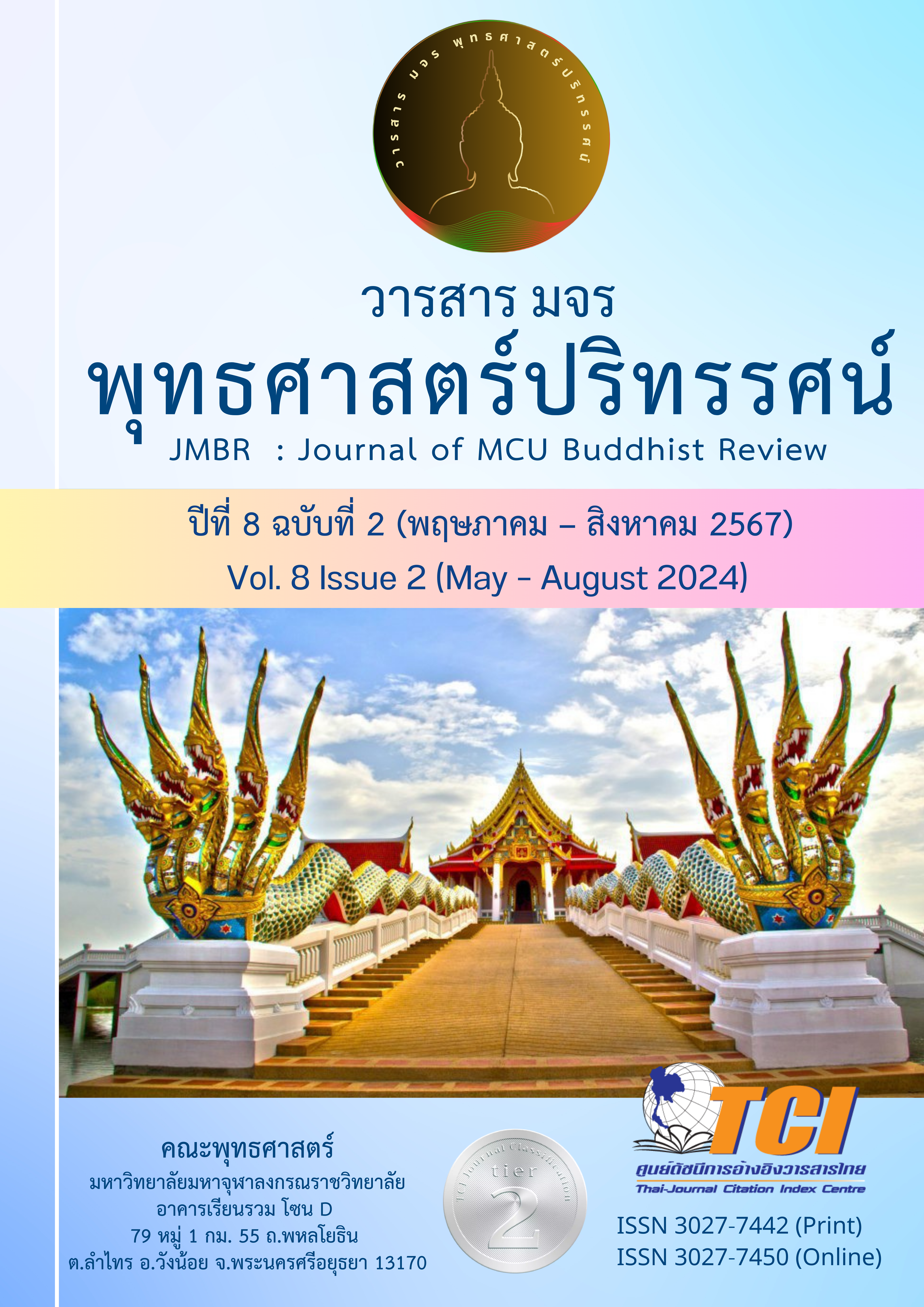การเปรียบเทียบหลักการสงเคราะห์ชุมชนวิถีพุทธศาสนานิกายเถรวาท กับหลักการอภิบาลชุมชนวิถีคริสตศาสนานิกายโรมันคาทอลิก: กรณีศึกษาเปรียบเทียบสองชุมชนในจังหวัดประจวบคีรีขันธ์
Main Article Content
บทคัดย่อ
บทความวิจัยนี้มีวัตถุประสงค์เพื่อ 1) เพื่อศึกษาหลักการสงเคราะห์ชุมชนวิถีพุทธศาสนานิกาย เถรวาท 2) เพื่อศึกษาหลักการอภิบาลชุมชนวิถีคริสต์นิกายโรมันคาทอลิก 3) เพื่อเปรียบเทียบหลักการสงเคราะห์ชุมชนวิถีพุทธศาสนานิกายเถรวาทกับหลักการอภิบาลชุมชนวิถีคริสตศาสนานิกายโรมันคาทอลิก
ผลการวิจัยพบว่า 1) หลักการสงเคราะห์ชุมชนวิถีพุทธศาสนานิกายเถรวาท ได้แก่ หลักสังคหวัตถุ 4 ประกอบด้วย 1) ทาน ให้การช่วยเหลือเกื้อกูลชุมชน 2) ปิยวาจา ให้คำปรึกษาและวัดเป็นแหล่งเรียนรู้ธรรม 3) อัตถจริยา ช่วยเป็นแหล่งจิตอาสา สามารถช่วยเหลือชุมชนอื่นๆ ได้ตลอดเวลา 4) สมานัตตตา ปฏิบัติคล้อยตามกฎระเบียบของชุมชนอย่างเคร่งครัด 2. หลักการอภิบาลชุมชนวิถีคริสต์นิกายโรมันคาทอลิก ได้แก่ 1) หลักความรักความเมตตา การฟื้นฟูความเชื่อ 2) หลักเกื้อกูล พระสงฆ์อภิบาลชุมชนโดยเข้าเยี่ยมเยียนสัตบุรุษในชุมชน และ 3) การแบ่งปัน คือ ความรัก และการช่วยเหลือแบ่งปัน 3. เมื่อนำหลักการสงเคราะห์ชุมชนของทั้งสองศาสนามาเปรียบเทียบความเหมือนและความแตกต่าง พบว่า ความเหมือนของทั้ง 2 ศาสนานั้น จุดประสงค์หลัก คือ ดำเนินการเพื่อป้องกัน แก้ไขช่วยเหลือ และส่งเสริมให้ผู้ที่ประสบความเดือดร้อนต่าง ๆ ในชุมชนให้สามารถช่วยเหลือตนเองได้ ความแตกต่าง คือหลักธรรมของแต่ละศาสนาที่นำมาปฏิบัติ ทำให้เกิดคุณูปการของการศึกษาเปรียบเทียบทั้ง 2 ศาสนานี้สามารถนำวิธีการสงเคราะห์ชุมชนในพระพุทธศาสนาเชื่อมโยงกับการอภิบาลชุมชนในศาสนาคริสต์ได้
Article Details

อนุญาตภายใต้เงื่อนไข Creative Commons Attribution-NonCommercial-NoDerivatives 4.0 International License.
- บทความที่ได้รับการตีพิมพ์เป็นลิขสิทธิ์ของวารสาร มจร พุทธศาสตร์ปริทรรศน์
- ข้อความใดๆ ที่ปรากฎในบทความที่ได้รับการตีพิมพ์ในวารสาร ถือเป็นความรับผิดชอบของผู้เขียนบทความ และข้อคิดเห็นนั้นไม่ถือว่าเป็นทัศนะและความรับผิดชอบของกองบรรณาธิการวารสาร มจร พุทธศาสตร์ปริทรรศน์
เอกสารอ้างอิง
กรมการศาสนา. (2525). พระไตรปิฎกภาษาไทย ฉบับหลวง. กรุงเทพฯ: การศาสนา.
จำเรียง ภาวิจิตร. (2557). ปัจจัยพื้นฐานในการเป็นวิถีชุมชนวัด/ชุมชนคริสตชนพื้นฐานในประเทศไทย. รายงานวิจัย ศูนย์วิจัยค้นคว้าศาสนาและวัฒนธรรม: วิทยาลัยแสงธรรม.
บาทหลวง ดร.อภิสิทธิ์ กฤษเจริญ และคณะ. (2554). ปัจจัยพื้นฐานในการเป็นวิถีชุมชนวัด/ชุมชนคริสตชนพื้นฐานในประเทศไทย. ศูนย์วิจัยค้นคว้าศาสนาและวัฒนธรรม. นครปฐม: วิทยาลัยแสงธรรม.
เบญจา มังคละพฤกษ์. (2552). พระกับการเมือง หลวงตามหาบัวกับทักษิณ บันทึกเหตุการณ์ทางการเมืองร่วมสมัย. นนทบุรี: บ้านหนังสือ.
พระธรรมปิฎก (ป.อ.ปยุตฺโต). (2543). ถึงเวลามารื้อปรับระบบพัฒนาคนกันใหม่. พิมพ์ครั้งที่ 5. กรุงเทพฯ: มูลนิธิพุทธธรรม.
พระคาร์ดินัล ฟรังซิสเซเวียร์ และเกรียงศักดิ์ โกวิชวานิช. (2558). ศิษย์พระคริสต์เจริญชีวิตประกาศข่าวดีใหม่. กรุงเทพฯ: มปพ..
พระเด่นชัย ยโสธโร (สุขพิพัฒน์) และคณะ. (2565). บทบาทพระสงฆ์ด้านการพัฒนาชุมชนและสังคม. วารสารสังคมศาสตร์มหาวิทยาลัยมหามกุฏราชวิทยาลัย. 5(1), 12-34.
มหาจุฬาลงกรณราชวิทยาลัย. (2539). พระไตรปิฎกภาษาไทย ฉบับมหาจุฬาลงกรณราชวิทยาลัยพุทธศักราช 2539. กรุงเทพฯ: มหาจุฬาลงกรณราชวิทยาลัย.
ศิลป์ชัย เชาว์เจริญรัตน์. (2549) หลักความเชื่อคริสเตียน. กรุงเทพฯ: สถาบันคริสเตียนศึกษาและพัฒนาคริสตจักร.
สมาคมพระคริสตธรรมไทย. (2531). พระคริสต์ธรรมคัมภีร์ภาคพันธสัญญาเดิมและพันธสัญญาใหม่ (ฉบับ 1971). กรุงเทพฯ: สมาคมพระคริสตธรรมไทย.
สมาคมคริสตธรรมในประเทศไทย. (2541). ไบเบิ้ล พระคริสต์คัมภีร์ ภาคพันธสัญญาเดิม. กรุงเทพฯ: คริสตธรรมในประเทศไทย.
อภิชาติ นามวงษ์. (2564). การอภิบาลคริสตชนคาทอลิกตามจิตตารมณ์ความรักเมตตาของพระสงฆ์คณะธรรมทูตไทย. วารสารวิชาการวิทยาลัยแสงธรรม. 13(2), 235-300.


